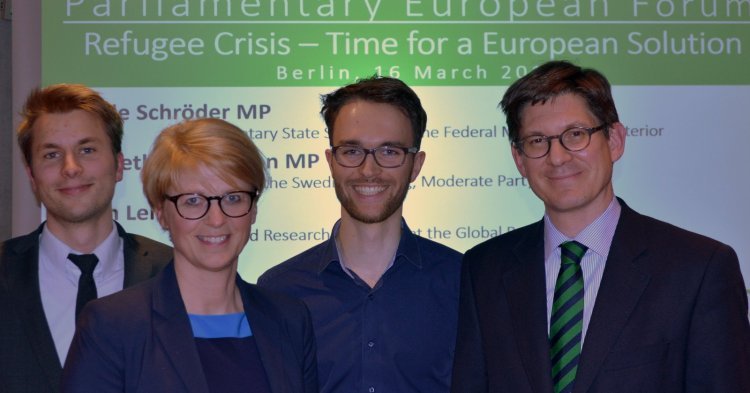On March 16 the Young European Federalists and the Parliamentary Group of Europa-Union Germany again invited guests to the Parliamentary European Forum (PEF) to Berlin, to discuss the theme ’Refugee Crisis - Time for a European Solution’. The discussion was held in English and was moderated by Vincent Venus. There were three regular speakers: Ole Schröder, Parliamentary State Secretary in the German Ministry of the Interior (CDU, European Peoples Party), Elisabeth Svantesson, member of the Swedish Parliament of the party ’New Moderate’ (Nya Moderaterna, also EPP), and Julian Lehmann from the think tank ’Global Public Policy Institute’. In addition there were two extra seats for the audience. Viewers could actively join the discussion on the fly, ask questions and raise issues.
Hard Politics vs humane Citizens?
Vincent opens the discussion and asks Mrs. Svantesson about the change in Swedish refugee policy. Mrs. Svantesson emphasises that Sweden had to take measures like the ’hopefully temporary border controls’ due to a disproportionate amount of refugees coming to Sweden. The country only has around 10 million inhabitants, but already shelters around a quarter of a million refugees and there is no capacity for more people.
Ole Schröder sees the reason for the growing number of national measures undertaken in the ’reluctance’ of Jean-Claude Juncker’s European Commission. Mr. Lehmann calls most ways to effectively reduce the number of incoming refugees illegal under international law. An opinion poll is quoted, saying that a majority of EU-citizens are open to help refugees. The question is asked: ’Are the people more open to refugees than the governments?’ Mr. Schröder asks for the date of the poll and stresses: ’The incidents of the night of New Year’s Eve in Cologne changed many people’s opinion.’
Bad Communication
Schröder criticises the bad communication with the refugees. There are other systems for non-EU-citizens that want to work or study in Germany, there is no need to try to get to Germany via the asylum system. People from the Balkans can apply for working visas. The people should be better informed. Also considering the European relocation plan Schröder sees problems regarding the refugees themselves. Even inside Germany it is difficult to make refugees stay inside cities or federal countries they have been relocated to.
Concepts without Implementation
Mr. Schröder’s idea of a European solution includes several aspects: strict border controls at the external Schengen borders and a relocation of the refugees within the EU, which requires a common European asylum system. How such a common asylum system will be designed is a long term question in his opinion. Furthermore, he stresses that so far at no time there was a majority of member states for a European relocation of refugees! Only Malta demanded a relocation in the past, ’and Italy’, he continues. Then he implies, that Italy in general is only interested in a quick recognition of migrants as persons entitled to asylum, so that they can quickly be relocated. In addition he suggests a reform of the current Dublin agreement.
Elisabeth Svantesson also thinks that the current system was ’made for a different time’ and today has become ’unhuman’. A guest criticises the discussion: ’It is not like millions of refugees suddenly fell from the sky! The situation in Lampedusa is well known since at least 2010. Still, there has been no improvement in a European asylum system since!’ Julian Lehmann suggests a harmonised asylum system. A central European asylum agency that will have to be located near the southern borders.
Greece under Pressure
Schröder thinks, that the closing of the Macedonian-Greek border by the Visegrád-countries works very well with Angela Merkel’s plan for relocation and a European solution. Greece would get under pressure and would be obliged to cooperate better with its EU partners. The Greek government must create more capacity and structures for asylum seekers within Greece. Julian Lehmann makes clear that ’we can’t leave Greece alone’. Projections talk of 150000 refugees arriving in Greece just next month. Lehmann refers to a European Commission road map for Greece. Another guest suggests that ’Germany should set a good example’ by already taking in its quota to boost the relocation of the 160,000 persons entitled to asylum, that has been agreed on the European level.
Ottoman Deals
Regarding the efforts to achieve an agreement between the European Union and Turkey, Ole Schröder is sceptical. So far Turkey is demanding a lot, but at the same time is ’willing or able’ to stop traffickers. The Swedish Parliamentary Svantesson also thinks that ’Turkey is not doing enough against smugglers’. A female guest from Australia compares the pursued refugee swap deal with Turkey, with an agreement between Australia and Malaysia, that has been rejected by the Australian supreme court, due to human rights abuses in Malaysia.
A member of the Europa-Union, Mathias Eichler, asks, if it was not reasonable for the EU to send funds directly to the communities in Germany that shelter many refugees, or to countries like Poland, if they took in refugees. He refers to the 3 billion Euro that will be given to Turkey in comparison. Another female guest makes clear that many refugees don’t come directly from battle zones, but from countries like Lebanon. Often it is the ’push factors’, including bad conditions for refugees in countries like Lebanon, rather than the ’pull factors’ for a continuing escape towards Europe. Ole Schröder in this regard emphasises his satisfaction with the donor conference for refugees in London. With the funds from that conference the conditions for refugees in Lebanon will improve.
Commentary by the author: The national Blame Game
Angela Merkel’s government is isolated in Europe, especially with the demand for a relocation mechanism of refugees within the European Union. Actually Ole Schröder is not confirming this directly, but indirectly if one combines his statements. Besides Italy, Greece and the European Commission of Jean-Claude Juncker the number of supporters for a permanent relocation system is small. Still, despite trying to form an alliance to achieve the common goal, at the discussion Schröder took every opportunity to harshly attack the Commission, Italy and Greece. This is very simple since no representative of both countries or the European institution were present at the discussion to comment or to vanquish the accusations. In the end Mr. Schröder, with his rhetoric himself has to accept the accusation of playing a blame game, that is rather part of the national problems of Europe, than part of a common European solution.


Follow the comments: |
|
